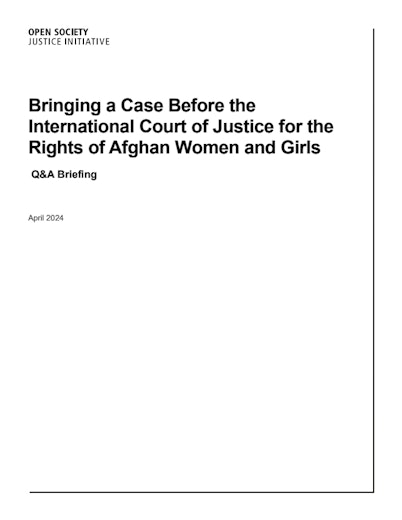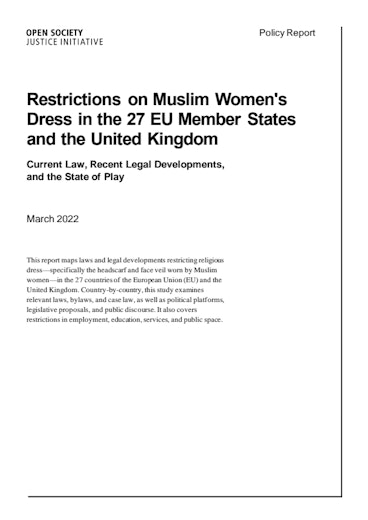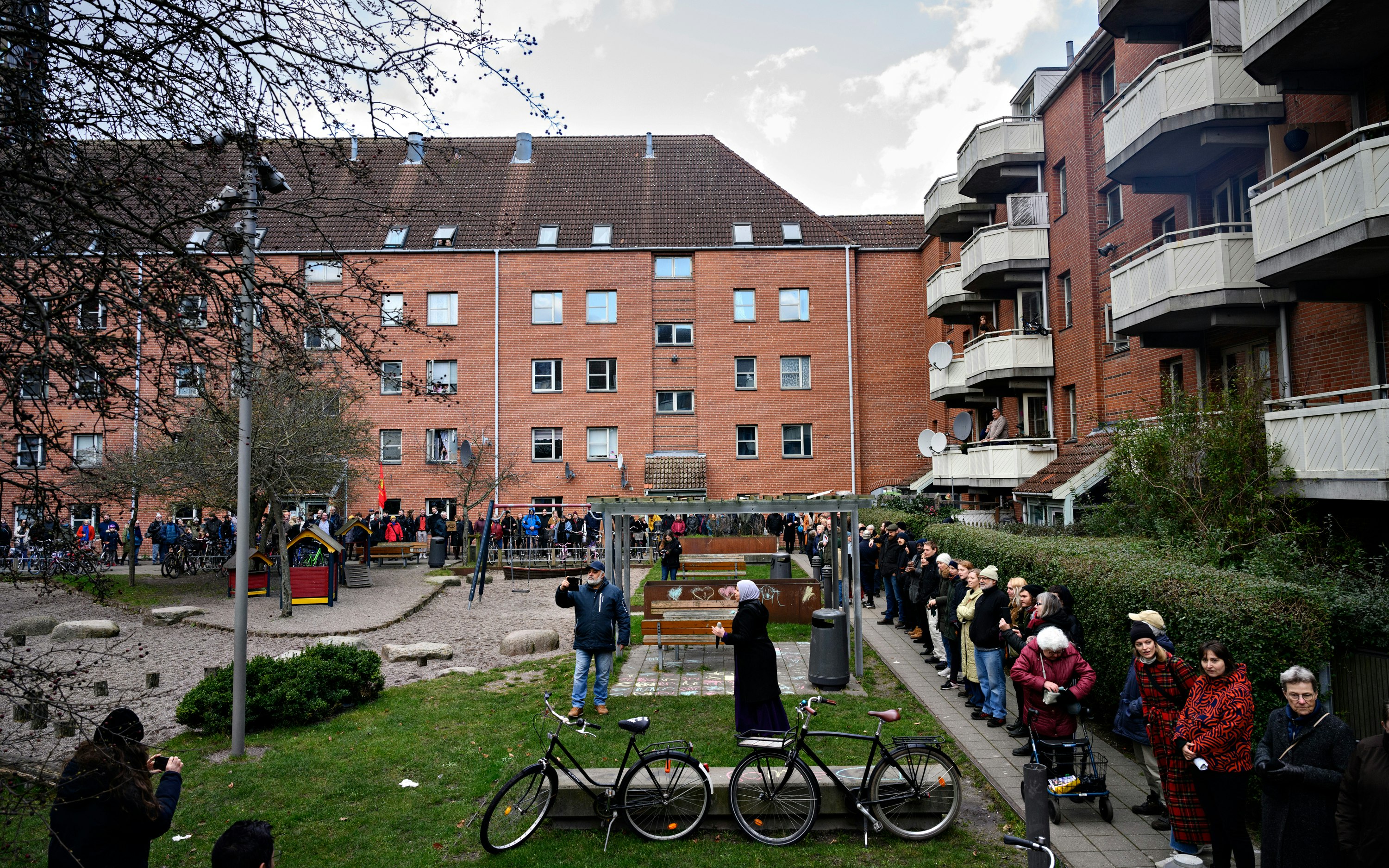Yean and Bosico v. Dominican Republic
Racial Discrimination in Access to Nationality
Two girls born in the Dominican Republic to Dominican mothers applied for copies of their birth certificates. Local officials refused their request, as part of a deliberate policy to deny documents such as birth certificates to Dominicans of Haitian descent, refusing them recognition of their nationality. As a result of the denial, the girls could not go to school and faced other serious problems. The Inter-American Court of Human Rights found that this was racial discrimination.
Facts
In 1997, the mothers of Dilcia Yean, then aged 10 months, and Violeta Bosico, then aged 12 years, went to the civil registry to ask for copies of their daughters' birth certificates. Both mothers had been born in the Dominican Republic and had documents proving their Dominican nationality. Both daughters were also born in the Dominican Republic. However, because they were of Haitian descent, the civil registry refused to give them copies of their birth certificates, and insisted that they produce a list of documents that were impossible to obtain.
This decision followed a long history of discrimination against Dominicans of Haitian descent. While the constitution of the Dominican Republic grants nationality to anyone born in the country under the principle of jus solis, it does not apply to those born "in transit." The government retrospectively decided to interpret this provision to mean that Haitian migrants, their children, and their grandchildren should be considered permanently "in transit" and therefore no longer eligible to be citizens, thus taking away the citizenship of thousands, and denying it to the two girls.
In a legal case taken to the Inter-American Commission by the Centre for Justice and International Law (CEJIL), the International Human Rights Law Clinic at the University of California, Berkeley, and the Movimiento de Mujeres Dominico-Haitianas (MUDHA), the mothers argued that their children were born on Dominican territory and should have been entitled to citizenship under the constitutionally-enshrined principle of jus solis, whereby citizenship is determined by place of birth, rather than by descent. Because they were refused permission to register their births, the girls were unable to obtain recognition of their legal personality, and could not enroll in school because they had no identity documents. As undocumented persons they were vulnerable to arbitrary expulsion from the country.
The government attempted to negotiate a settlement to the legal action and in fact provided birth certificates to the two girls, but without accepting that they had violated their human rights. The case was referred to the Inter-American Court of Human Rights.
Open Society Justice Initiative Involvement
The Justice Initiative submitted an amicus brief to the Inter-American Court of Human Rights describing the prohibition of racial discrimination in access to nationality in international law.
Arguments
Racial Discrimination in International Law. Racial discrimination is prohibited as binding jus cogens norm of international law. Direct and indirect discrimination are prohibited. Once a prima facie case of discrimination is made out the burden shifts to the state to justify the difference in treatment.
Discrimination in Access to Nationality. The denial of nationality to Dominicans of Haitian descent amounted to direct discrimination on grounds of ethnicity, and the procedural obstacles for getting birth certificates in cases of late declarations of birth was indirect discrimination.
Racial Discrimination in Access to Nationality as a Global Problem. Minority groups around the world in countries such as Burma, Russia, Kenya, Thailand, Kuwait, Democratic Republic of the Congo, and Bhutan are discriminated against in a similar fashion.
The Inter-American Court of Human Rights issued a landmark decision in October 2005, affirming the human right to nationality as the prerequisite to the equal enjoyment of all rights as civic members of a state.
The court held that the principle of jus soli was enshrined in the constitution and could not be further restricted. The interpretation of the law that defined individuals born "in transit" so as to include all undocumented migrants was too broad. The burden of producing so many documents in order to claim nationality meant that it was granted in a discriminatory fashion.
The court held that racial discrimination in access to nationality breaches Articles 1, 21, and 27 of the American Convention of Human Rights and concluded that the discriminatory application of nationality and birth registration laws rendered children of Haitian-descent stateless. This violated the recognition of their juridical personality, and was an affront to their dignity. They were unable to access other critical rights to education, to a lawfully registered name, and to equal protection before the law. The expulsion of Violeta Bosico from school violated her right to special protection as a child.
The court ordered damages of $8,000 to each of the two children, ordered that the judgment be published and that the state apologize to the girls. They also ordered that the law be changed so as to ensure that birth certificates were issued in a way that was not discriminatory and that there was a full judicial review of that process. Education must be available to all, no matter their background.
Implementation
October 18, 2005. The Senate of the Dominican Republic issues a resolution rejecting the judgment.
December 14, 2005. The Supreme Court of Justice of the Dominican Republic passes a decision upholding the previous law that undocumented migrants should be considered as being "in transit," in direct defiance of the decision of the Inter-American Court.
July 2009. Amendments passed to the Constitution to introduce the principle of jus sanguinis.
Co-counsel on the case continue to fight for full implementation of the judgment, by explaining to the court the ways in which the government has failed to comply with the decision, and how recent policies have sought to entrench into law the discrimination that was condemned in the judgment.
The Justice Initiative is working to ensure implementation of the decision, particularly those parts that deal with the right to nationality, juridical personality, and equality before the law, and also to address the evolving situation in the Dominican Republic whereby the government is now not only arbitrarily depriving Dominican children of Haitian descent of their Dominican nationality (by refusing to register their births) but also effectively denationalizing adult Dominicans of Haitian descent.
The Justice Initiative is also litigating to enforce the decision of the Inter-American Court of Human Rights in Bueno v. Dominican Republic.
Judgment of the Inter-American Court.
The Justice Initiative submits an amicus brief to the Inter-American Court.
The Inter-American Court declares the case admissible.
Related Cases
Bueno v. Dominican Republic
This case is about statelessness in the Dominican Republic. It focuses on a Dominican man who was denied identity documents because he was of Haitian descent.
Nubian Community in Kenya v. Kenya
Africa's human rights tribunal found that members of Kenya's Nubian community face arbitrary procedures that restrict their access to vital national identity documents.
Kuric v. Slovenia
This case concerns citizenship rights and statelessness in Slovenia.
Related Work
Q&A: Bringing a Case Before the International Court of Justice for the Rights of Afghan Women and Girls
This paper considers 21 questions around the feasibility of bringing a complaint at the International Court of Justice against Afghanistan's Taliban for egregious and prevalent violations of women’s and girls’ rights.

Restrictions on Muslim Women's Dress in the 27 EU Member States and the United Kingdom
This policy brief and accompanying fact sheet map EU and UK laws and pending legislation restricting religious dress—specifically the headscarf and face veil worn by Muslim women.

Evidence Suggests Evictions in a Danish Neighborhood were Racially Biased. Now the Case is Before the High Court.
This case may set an important precedent for standards for discrimination in Denmark.
